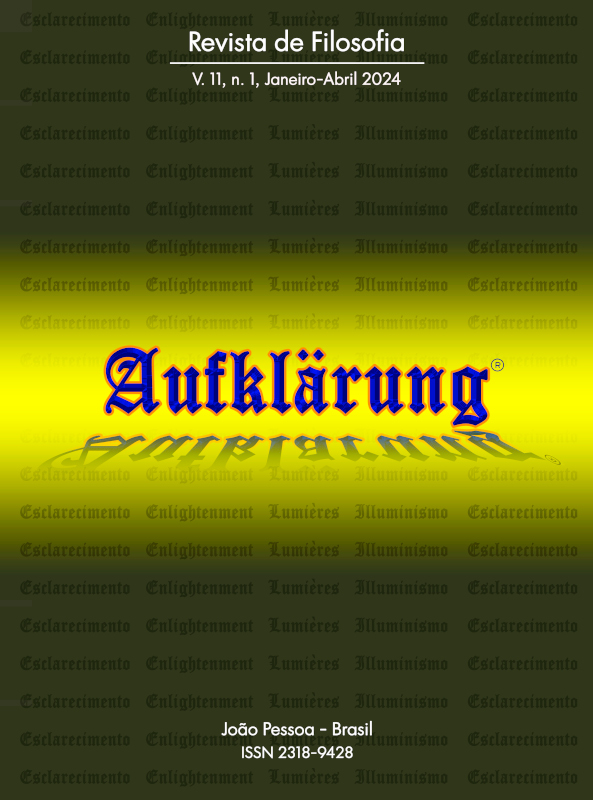The representativity of the concept of plurality in Socrates and Plato: reflections in the light of Hannah Arendt’s thoughts
DOI:
https://doi.org/10.18012/arf.v11i1.67260Keywords:
Policy, Plurality, Hannah ArendtAbstract
This article is the result of a bibliographic and hermeneutic investigation. In the light of Hannah Arendt's thought, the writing thematizes the representativeness of the conception of human plurality present in the reflections of Socrates and Plato. First, it investigates how the conception of plurality is present in the thought of Socrates, considered by Arendt, a political philosopher par excellence and the one who established plurality as the law of the Earth. Therefore, the conception of plurality manifested in Plato's reflections is analyzed and, mainly, some of the consequences resulting from Socrates' condemnation and death. We consider this confrontation essential to recover and/or point out the importance of plurality in spaces of social participation, accomplishing with others what certainly could not be done alone and/or isolated. Plurality is, therefore, composed of singularities, and the fact that we are together with other singular beings is what impels us to communicate with each other.
Downloads
References
ARENDT, H. O que é política?. Trad. de Reinaldo Guarany. 5.ed. Rio de Janeiro: Bertrand Brasil, 2004.
ARENDT, H. A condição humana. Trad. de Roberto Raposo. Revisão e apresentação de Adriano Correia. 11. ed. rev. Rio de Janeiro: Forense Universitária, 2010.
ARENDT, H. Origens do totalitarismo: antissemitismo, imperialismo, totalitarismo. Trad. de Roberto Raposo. São Paulo: Companhia das Letras, 1989.
ARENDT, H. Sobre a violência. Trad. de André Duarte. Rio de Janeiro: Relume Dumará, 2001.
ARENDT, H. A promessa da política. Trad. de Miguel Serras Pereira. Lisboa: Relógio D’ Água Editores, 2007.
ARENDT, H. A dignidade da política. Rio de Janeiro: Relume-Dumará, 2002.
ARENDT, H. A vida do Espírito. Trad. de Antonio Abranches; César Augusto R. de Almeida; Helena Martins. Rio de Janeiro: Relume Dumará, 2000.
ARENDT, H. Homens e tempos sombrios. Trad. de Denise Bottmam. São Paulo: Companhia das Letras, 2008.
ARENDT, H. Entre o passado e o futuro. Trad. de Mauro W. Barbosa. 7. ed. São Paulo: Perspectiva, 2013.
ECCEL, D. Hannah Arendt, uma leitora crítica de Platão. Archai, Brasília-DF, s/v, n. 8, pp. 27-37, jan-jun 2012
GADAMER, H. G. Verdade e Método: traços fundamentais de uma hermenêutica filosófica. Tradução Flávio Paulo Meurer. Petrópolis, RJ: Vozes, 2012. I v. .85-326-1787-5.
Additional Files
Published
How to Cite
Issue
Section
License

This work is licensed under a Creative Commons Attribution 4.0 International License.
Journal general policy
1.This journal works under a Creative Commons License aplied to online journals. That icence can be read in the following link: Creative Commons Attribution 4.0 International (CC BY 4.0).
2.Accordingly to this License, a)the journal declares that authors hold the copyright of their articles without restrictions, and they can archieve them as post-print elsewhere. b)the journal allow the author(s) to retain publishing rights without restrictions.
Metadata Policy for information describing items in the repository
1. Anyone may access the metadata free of charge at anytime.
2.The metadata may be re-used in any medium without prior permission, even commercial purposes provided the OAI Identifier or a link to the original metadata record are given, under the terms of a CC BY license refered for the Journal.







































